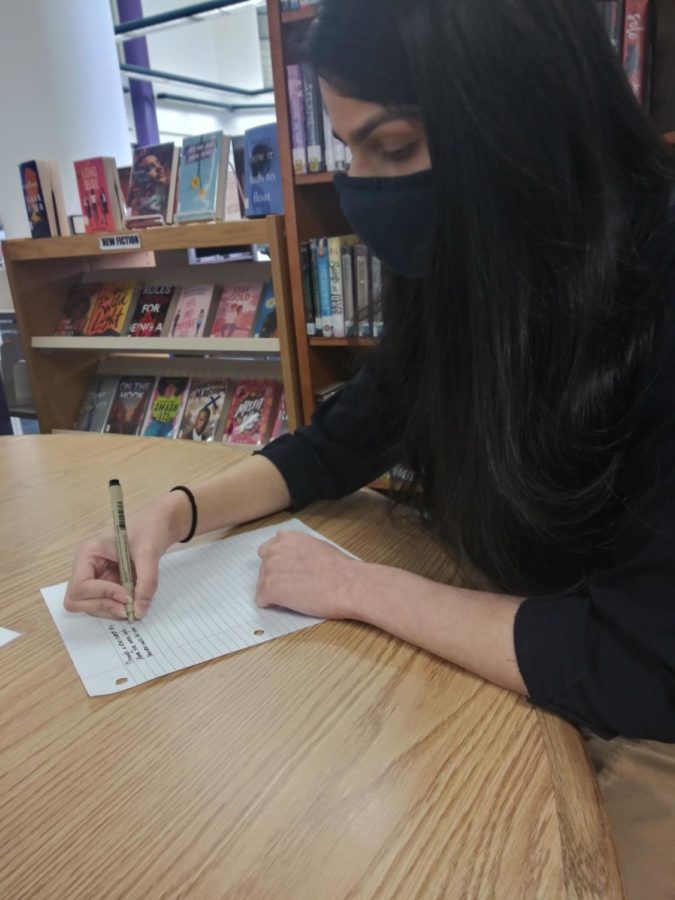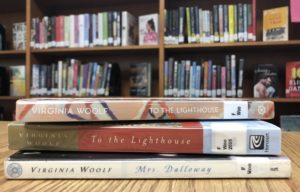Poetry enhances student creativity
Senior Aneesha Fernandez writes a poem in the school library during CT on March 1. Though poetry may seem daunting at first, new writers can improve by regularly engaging with poetry through reading and writing in their day-to-day lives, according to iUniverse. “Just put your pen to paper. Write something. It doesn’t have to be the greatest poem in the world. No one expects you to be Emily Dickinson or Maya Angelou,” sophomore Kheya Siripurapu said. “It’s your poem. Just keep writing and you’ll get better.”
March 10, 2022
From strict rhyme schemes to smooth, lyrical free verse, poetry serves as an outlet for many writers to draw upon their passions to create a vivid world of their own. Through poetry, students can utilize as little or as many rules of writing as they please, unbound to the literal or logical.
“Poetry is so unique that it just conveys different emotions depending on how you write it,” junior Abhinaya Karthana said. “It expands my mind to talk about things from a different perspective. I feel like it’s an entirely different world, and it’s a great one to immerse yourself in.”
Creative Writing is an elective offered at school that gives students an opportunity to delve into poetry and experiment with various writing styles, as well as gain feedback on their writing. Studies show that using poetic language improves literary awareness and creative thinking skills.
“After giving myself a proper chance to explore writing in verse, I found I could communicate ideas with more depth and precision,” junior Srija Upadhyay said. “I’ve always struggled to build strong plotlines, but poetry gives me a way to bypass that. Instead of plot, I use heavy description to drive a piece’s narrative, so I don’t have to worry as much about a short storyline causing a piece to suffer.”
For some writers, sharing poetry between family and close friends conveys a level of vulnerability that can strengthen bonds. Writing about more personal emotions can connect readers to the mind of the writer and can often evoke empathy.
“Through my poetry, I can say a lot of things that sometimes I’m not able to say when I’m actually speaking,” sophomore Kheya Siripurapu said. “I do share a lot of poems with my family and friends. It’s definitely cathartic and has helped me gain clarity on certain situations, especially if they are difficult or make me emotional.”
In addition, poetry can be used to express more complex sentiments that may help writers understand and process emotions in a therapeutic way, express their feelings or view past experiences from a more objective or mature lens, according to Medical News Today.
“In one poem, I talked about my struggle with fitting in because I’m a kid who moves around a lot, so it’s hard to leave behind friends,” Karthana said. “After writing it, I understood my situation a little bit better, and it definitely helped me show other people how it feels in a way that they can understand.”
Students who are interested can submit their poems to a variety of contests at both the national and local level. Publishing their poems can give students a sense of completion and significance to their writing ability. According to the New York Times, some places for teens to annually submit poetry and other types of writing include the Scholastic Art and Writing Awards, The Apprentice Writer and the Penguin Random House Creative Writing Awards. Visit their websites to gain more information on when and how to apply.
“I usually write about whatever’s going on in my life—like my life experiences—because poetry is my way of expressing myself,” Siripurapu said. “When I first had a poem published in Andromeda, [the school’s literary arts magazine,] some friends reached out to me and talked about what they thought about it. It was so nice to connect with people over something that I cherish so much.”
Through the creative use of metaphors and imagery, poems can stimulate the senses and subvert the ordinary. Though poetry may seem daunting at first, new writers can improve by regularly engaging with poetry through reading and writing in their day-to-day lives, according to iUniverse.
“There’s no such thing as bad poetry,” Karthana said. “All poetry is beautiful in its own way. I genuinely think if you’re writing it from your heart, and it’s natural and it’s raw, then it is a work of art in itself.”





